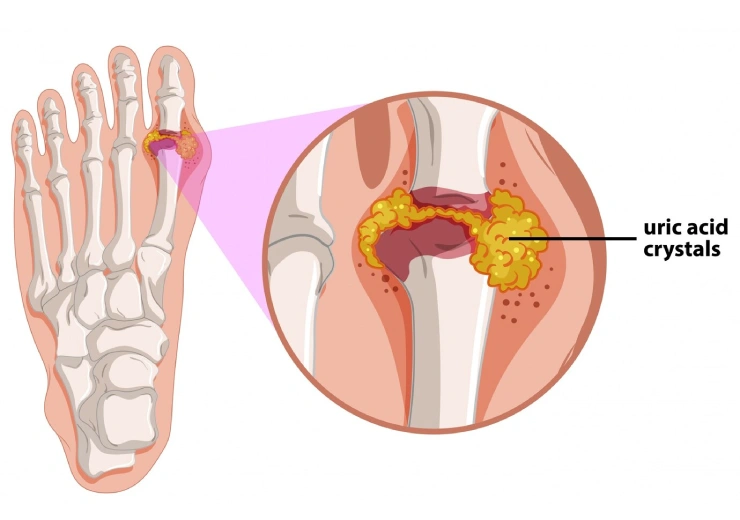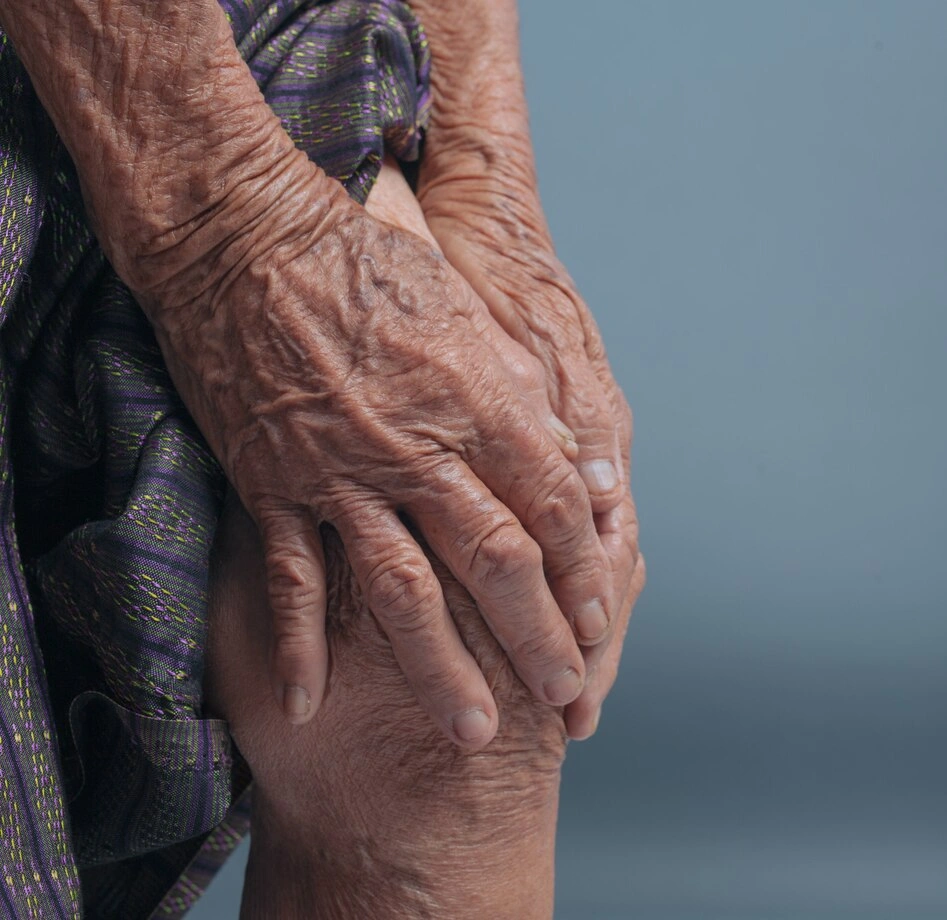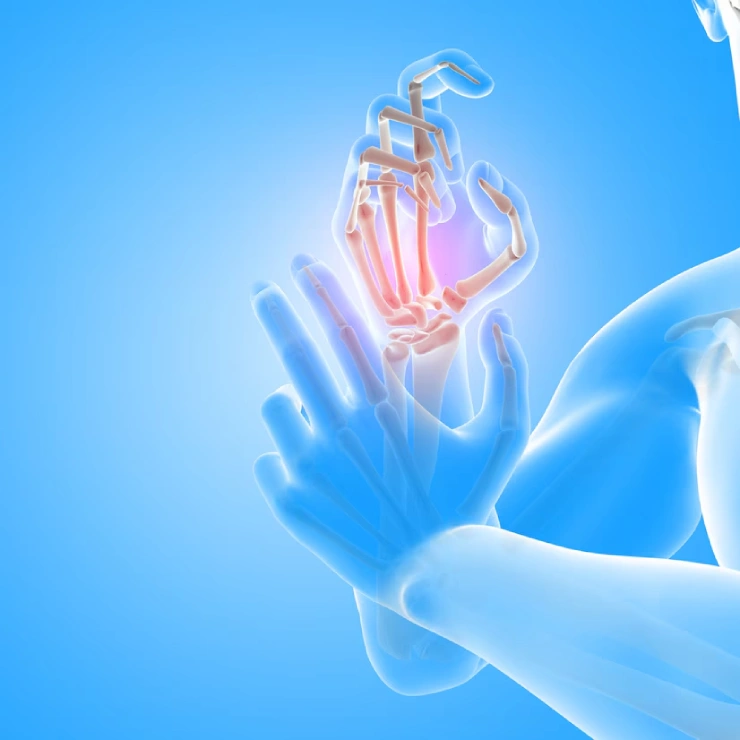
Comprehensive Overview of Gout Disease
If you are facing such a painful gout disease, it’s time to look into the details.
Gout is an inflammatory type of arthritis that causes an immense amount of pain and swelling in your joints. Furthermore, it usually has fits that last for a week or two and then eventually resolve. Gout usually develops in your big toe or the lower part of the foot. It happens when your body’s urate levels build up over a long time. Likewise, because of this, it forms needle-shaped crystals in and around the joint. Therefore, it leads to arthritis and inflammation of the joint. When the body produces too much urate or removes too little, it increases the chances of gout. However, there are numerous individuals with high levels of serum urate who will not produce gout.
Moreover, on this page, we will provide a brief overview of gout, its significant early-stage symptoms, causes, and more. Read this page until the end to learn the precise details.
Who Gets Gout?
Numerous people face gout disease. It is one of the most common diseases in men, but not in women. It normally develops slowly in the middle-aged group of men. However, in women, gout doesn’t develop before menopause, which is why women tend to face the gout condition at a later age than men. Younger individuals develop gout less frequently. However, they might face it, this disease tends to be more severe and painful.
Significant Symptoms that Indicate Gout Disease
Gout attacks are unbearably painful and may arise suddenly, usually overnight. At the time of a gout flare, you might feel these early-stage gout symptoms that are mentioned below:
- Severe pain
- Redness or discoloration
- Stiffness
- Swelling
- Heat or burning feeling in the joints
Furthermore, if gout remains untreated for years, tophi may form. A tophus is a mass of needle crystals which produce hard swellings beneath the skin, around the joints and in and around the rest of the organs. Tophi are initially painless. However, over time, they can become painful and may lead to bone and soft tissue damage as well as distorted joints.
Other people with gout can be at risk of getting or developing additional conditions or complications, particularly affecting the heart and kidneys. Typical conditions include:
- Myocardial Infarction (Heart Attack)
- Nephrolithiasis (Kidney Stones)
- Congestive Heart Failure
- Diabetes
- Chronic Kidney Disease
- Hypertension (High Blood Pressure)
- Obesity
Imperative Risk Factors of Gout That You Must Be Aware Of
Do not panic if you are facing such a painful situation because, for the record, it can occur to anyone despite of gender. Men majorly consist of more chances to develop gout. On the other hand, women usually do not experience such pain until after menopause. Individuals with certain health conditions are more likely to develop gout fits. So, ensure to go through some significant risk aspects of it:
- Congestive Heart Failure
- Kidney Disease
- Diabetes
- High Blood Pressure (Hypertension)
- Obesity or Overweight
- Blood Cancer
Moreover, you may experience gout if you:
- Consume high quantities of animal proteins
- Take diuretic medicines (water pills)
- Take Immunosuppressants
- Frequently Drink Alcohol
- High Urate Level
- Increasing Age
- Healthy Food
- Consumption of Purine-Rich Food
- Menopause
- Genetic Disorder
- Consuming Sugary Foods

Which Foods Majorly Cause Gout?
Drinking or consuming high purine foods can lead to high uric acid levels in your body system which can cause gout. Furthermore, here we have mentioned the food which increases the chances of gout:
1.Sugary Sweets and Drinks
Like: Food Pouches, Sweetened Coffee, Soft Drinks, Sports Drinks, Flavored Waters, Fruit Juices, Fruit Flavored Punches, etc
2. High Fructose Corn Syrup
Like: Soda, Juice, Candy, Cookies, Sauces, etc
3. Alcohol
Like: Beer, Whiskey, Rum, Jin, etc
4. Organ Meats
Like: Liver, Tripe, Sweetbreads, Brains and Kidneys
5. Game Meats
Like: Goose, Veal and Venison
6. Certain Seafood
Like: Mussels, Herring, Tuna, Trout, Scallops, Codfish, and Haddock
7. Red Meat
Like: Lamb, Bacon, and Pork
8. Turkey
Especially processed Deli Turkey
9. Gravy
Like: Oily Gravies, Fat-based Gravies, and Meat Sauces

What are the Major Treatments of Gout?
Treating gout is a mix of managing your symptoms during a flare-up and lowering the level of high-purine drinks and foods how frequently you consume. Furthermore, here are some of the medication treatments that you will get from your best doctor.
1. NSAIDs
OTC (Over-the-counter) NSAIDs, like naproxen and ibuprofen, can help you reduce the pain and swelling during gout. In some circumstances, individuals with kidney diseases, stomach ulcers and other health issues should not take NSAIDs medications. Before taking NSAIDs medications, ensure to have a heart-to-heart health conversation with your doctor.
2. Colchicine
It is a prescribed medication that can help you prevent inflammation and severe pain if you take it within 24 hours of a gout attack.
3. Corticosteroids
It is a prescribed medication that helps to prevent inflammation and swelling. Your doctor may prescribe oral (consumption via mouth) medicines. Additionally, they may suggest that you take corticosteroid injections into a muscle near your joint or your affected joints.
A skilled and experienced doctor might prescribe medicines to help reduce your uric acid levels. Likewise, the most familiar medicines that reduce uric acid are:
- Allopurinol
- Febuxostat
- Pegloticase
- Probenecid
How Can You Manage a Gout Attack?
Here we have mentioned some effective ways that will help you manage your early-stage gout symptoms:
- Avoid sweet drinks and alcohol
- Ensure to elevate your affected joints above your heart level as frequently as you can
- Drink Plenty of Water
- Icing your Joints. Ensure to wrap an ice pack for 15-20 minutes around the affected joints, a few times a day
- Don’t put pressure or stress on your joints
- Avoid extreme physical activities or exercise

When Should You Visit Us?
Do not wait for the pain to increase. Visit Kush Orthopedic & Health Centre if you experience sudden, extreme pain in any part of your joints. If your joint is swollen, and it causing redness or discoloration, you must visit us without thinking twice. Gout shares many early-stage gout symptoms with infections that need to be treated as soon as possible. Talk to our skilled and experienced doctors if you are having more often gout attacks or id your gout signs are more unbearable than they used to be.
Wrapping It Up!
Whether it’s a minor complication or major, never try to ignore such situations which causing you immense pain. Further, we hope this write-up has provided you with all the basic to major details about gout attacks. Nevertheless, if you are still stuck searching for orthopedic specialists, your search ends here. At Kush Orthopedic & Health Centre, we have a team of experienced and qualified professionals who are all set to treat your every health problem with the right solution. So, wasting another minute would lead to increasing pain. Call us or book your appointment today and let us handle your health situation.
Frequently Asked Questions
The thing you can do to avoid future gout attacks is:
- Eat healthy
- Avoid drinking alcohol
- Don’t consume sugar-containing food items
- Avoid eating purine-rich food
- Avoid eating high-animal-rich protein
Here are the top three foods and drinks you must avoid:
- Purines
- Fructose
- Alcohol
If you are facing severe pain and inflammation due to gout disease, yes, you will need medicines to treat gout. At Kush Orthopedic & Health Centre, our top-notch doctor will prescribe effective medicines to prevent your gout.
